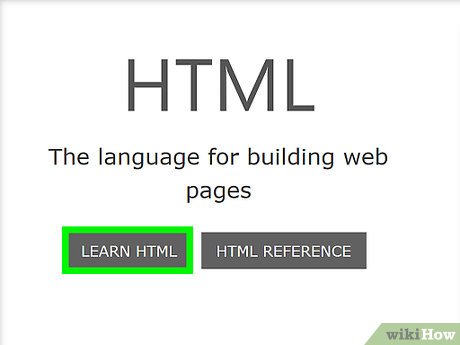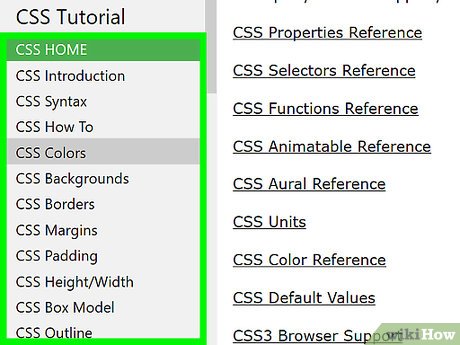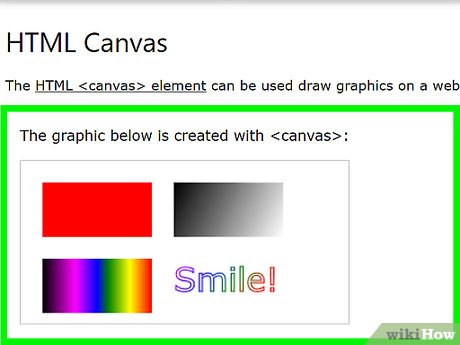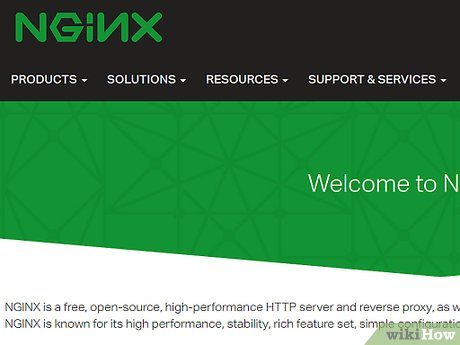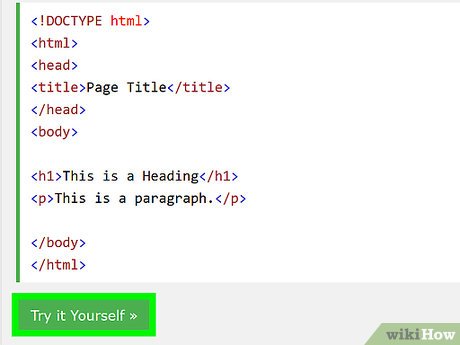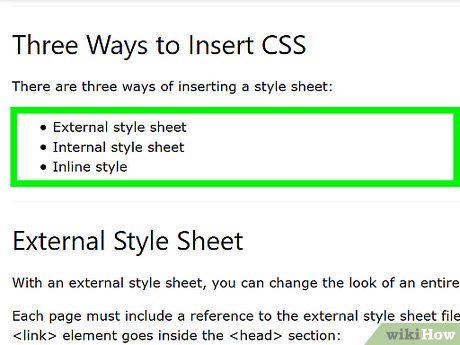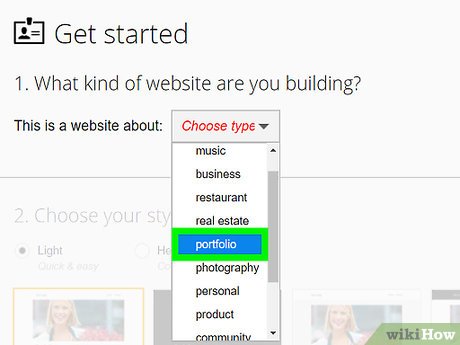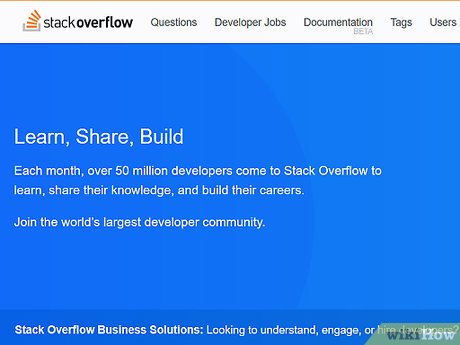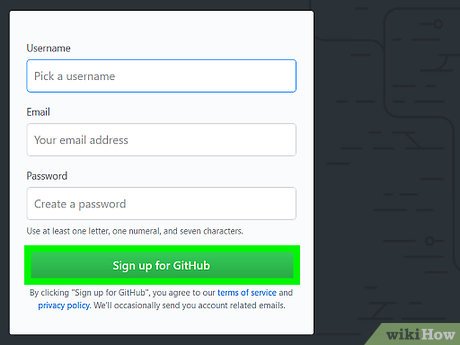How to Become a Full Stack Programmer
Part 1 of 3:
Learning How to Code
-
 Determine which languages you want to learn. You don't need to memorize every language, you just need to know the right set of languages. To be a well-rounded full-stack developer, you'll need to know at least one dynamic language, one statically typed language, HTML, CSS, and SQL.[1]
Determine which languages you want to learn. You don't need to memorize every language, you just need to know the right set of languages. To be a well-rounded full-stack developer, you'll need to know at least one dynamic language, one statically typed language, HTML, CSS, and SQL.[1]- Dynamic languages are great for beginners because you can see results instantly. These languages include PHP, JavaScript, Ruby, and Python.
- Statically typed languages are stable and maintainable. They include C++, Java, and C#.
- HTML and CSS are the building blocks of a website.
- SQL is the language that's used to communicate with databases.
-
 Concentrate on one programming language at a time. Even though full stack development means knowing a variety of different languages and software, learning multiple languages at the same time can be incredibly difficult. Instead, consider concentrating on one language and practicing it until you become proficient before moving onto another language.[2]
Concentrate on one programming language at a time. Even though full stack development means knowing a variety of different languages and software, learning multiple languages at the same time can be incredibly difficult. Instead, consider concentrating on one language and practicing it until you become proficient before moving onto another language.[2] -
 Take online training classes. There are a variety of online training classes that will teach you programming from the ground-up. Some classes are free, while others cost money. If you are brand new to programming or want to refine a particular skill, consider signing up for classes online.[3]
Take online training classes. There are a variety of online training classes that will teach you programming from the ground-up. Some classes are free, while others cost money. If you are brand new to programming or want to refine a particular skill, consider signing up for classes online.[3]- Popular online training programs include Treehouse, Codecademy, Udacity, and Code Avengers.
-
 Read programming books and manuals. If you'd rather learn on your own, without instruction, books and manuals are the most effective ways to learn code. Make sure that as you learn, you have a place to actively test the code so that you know that you're doing it correctly. Search online for programming guides and manuals for the specific programming language you're trying to learn.[4]
Read programming books and manuals. If you'd rather learn on your own, without instruction, books and manuals are the most effective ways to learn code. Make sure that as you learn, you have a place to actively test the code so that you know that you're doing it correctly. Search online for programming guides and manuals for the specific programming language you're trying to learn.[4]- You can stage and deploy the code that you write on websites like CSSDesk, Jsfiddle.net, and Codepen.io.
-
 Get a degree in computer science. A computer science degree will teach you more about software, hardware, networks, and other IT applications. While a degree isn't required to become a full-stack developer, the skills that you learn in school will translate when you do professional work. See if you can get into a computer science program when you go to college.[5]
Get a degree in computer science. A computer science degree will teach you more about software, hardware, networks, and other IT applications. While a degree isn't required to become a full-stack developer, the skills that you learn in school will translate when you do professional work. See if you can get into a computer science program when you go to college.[5]- Because programming technology is constantly evolving, a computer science degree may not give you the long-lasting skills that you need as a full-stack developer.
Part 2 of 3:
Developing Your Skills
-
 Become an expert at HTML and CSS. Two of the most important building blocks in web development are HTML and CSS. HTML allows you to add content to your website and CSS allows you to style that content. Before you take on more complex languages, make sure that you're an expert at CSS and HTML.[6]
Become an expert at HTML and CSS. Two of the most important building blocks in web development are HTML and CSS. HTML allows you to add content to your website and CSS allows you to style that content. Before you take on more complex languages, make sure that you're an expert at CSS and HTML.[6] -
 Learn how to administrate and use servers. You don't need to be an expert at back-end server administration but you must know how to do basic server management. Learn how to manage and edit users, do basic shell scripting, and how to connect to remote servers. You should also be familiar with how to use server management software like Apache and Nginx.[7]
Learn how to administrate and use servers. You don't need to be an expert at back-end server administration but you must know how to do basic server management. Learn how to manage and edit users, do basic shell scripting, and how to connect to remote servers. You should also be familiar with how to use server management software like Apache and Nginx.[7] -
 Build a website. The best way to start developing your skills is to put them into practice actively by creating software or websites. Start off by creating a simple website using HTML then deploy it to a hosting provider. Once it's live, you can style it, implement your back-end software into the HTML, and connect the site to a database that stores all of your content. Building a site will allow you to practice a variety of different skills.[8]
Build a website. The best way to start developing your skills is to put them into practice actively by creating software or websites. Start off by creating a simple website using HTML then deploy it to a hosting provider. Once it's live, you can style it, implement your back-end software into the HTML, and connect the site to a database that stores all of your content. Building a site will allow you to practice a variety of different skills.[8] -
 Stay up to date with the latest technology. Visit programming blogs, watch programming vlogs, participate in workshops, and talk to other programmers to stay on the cutting edge of technology. As a full stack developer, your skill set is constantly evolving and changing. To stay competitive, you'll need to know about the new programming technology and methods that are coming out.[9]
Stay up to date with the latest technology. Visit programming blogs, watch programming vlogs, participate in workshops, and talk to other programmers to stay on the cutting edge of technology. As a full stack developer, your skill set is constantly evolving and changing. To stay competitive, you'll need to know about the new programming technology and methods that are coming out.[9]
Part 3 of 3:
Getting a Job
-
 Build a personal website to show off your skills. If you have no experience, an employer will want to see that you have a basic understanding of how to code. If you don't have any samples at all, you should build a personal website. Integrate things that you've built from the ground up to display your skills.
Build a personal website to show off your skills. If you have no experience, an employer will want to see that you have a basic understanding of how to code. If you don't have any samples at all, you should build a personal website. Integrate things that you've built from the ground up to display your skills. -
 Learn common programmer lingo. There are certain things that most full-stack developers should know off the top of their heads. This includes things like understanding hash tables, understanding how trees can be beneficial as data structures, understanding the Big-O analysis, and when to use an object vs. an array. Visit programming forums and read blogs to get a better understanding of these concepts.[10]
Learn common programmer lingo. There are certain things that most full-stack developers should know off the top of their heads. This includes things like understanding hash tables, understanding how trees can be beneficial as data structures, understanding the Big-O analysis, and when to use an object vs. an array. Visit programming forums and read blogs to get a better understanding of these concepts.[10]- You may be asked these questions in an interview.
-
 Build a network of developers. You may hear of job opportunities from other programmers that you meet. Follow people on social media, join groups, and engage in online dialogue to meet new people that are involved with programming or development.[11]
Build a network of developers. You may hear of job opportunities from other programmers that you meet. Follow people on social media, join groups, and engage in online dialogue to meet new people that are involved with programming or development.[11]- You can find popular online communities for developers and programmers on sites like Stack Overflow, Reddit, SitePoint, and Google+ Communities.[12]
-
 Visit online job boards and search for jobs that match your skills. Once you become proficient in a set of full-stack programming skills, you can start looking for jobs. Search for positions that utilize the programming languages that you know and apply for the job.
Visit online job boards and search for jobs that match your skills. Once you become proficient in a set of full-stack programming skills, you can start looking for jobs. Search for positions that utilize the programming languages that you know and apply for the job.- Popular job boards for programmers include Github, Indeed, and Stack Overflow.
Share by
Jessica Tanner
Update 05 March 2020
